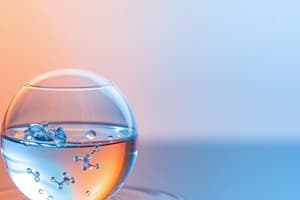Podcast
Questions and Answers
How do ionic bonds differ from covalent bonds in the way electrons are handled?
How do ionic bonds differ from covalent bonds in the way electrons are handled?
Ionic bonds involve the transfer of electrons to form oppositely charged ions, while covalent bonds involve the sharing of electrons.
What causes the polar nature of water molecules?
What causes the polar nature of water molecules?
The polar nature of water molecules is caused by oxygen's greater attraction for shared electrons, resulting in a slight negative charge on oxygen and a slight positive charge on hydrogen.
Why does water have a high boiling point compared to other small molecules?
Why does water have a high boiling point compared to other small molecules?
Water has a high boiling point due to the strong hydrogen bonds that require more energy to break compared to the interactions in lighter molecules.
How does the structure of ice differ from that of liquid water, and why is this important?
How does the structure of ice differ from that of liquid water, and why is this important?
What role do hydrogen bonds play in the behavior of water molecules?
What role do hydrogen bonds play in the behavior of water molecules?
What is the significance of cohesion in water for plant transport?
What is the significance of cohesion in water for plant transport?
How does water's polarity contribute to its function as a solvent?
How does water's polarity contribute to its function as a solvent?
In what way does water's high heat capacity benefit living organisms?
In what way does water's high heat capacity benefit living organisms?
Explain how water's adhesive property affects its interaction with surfaces.
Explain how water's adhesive property affects its interaction with surfaces.
What role does water play in biological reactions within organisms?
What role does water play in biological reactions within organisms?
Describe how ice contributes to aquatic life during winter.
Describe how ice contributes to aquatic life during winter.
What is the role of surface tension in water, and how does it affect small organisms?
What is the role of surface tension in water, and how does it affect small organisms?
Why is water considered a unique substance essential for life?
Why is water considered a unique substance essential for life?
Flashcards
Polar Covalent Bond
Polar Covalent Bond
A type of chemical bond where atoms share electrons, but one atom attracts the shared electrons more strongly, creating slightly positive and negative regions in the molecule.
Hydrogen Bond
Hydrogen Bond
Weak attractions between the slightly positive hydrogen atom of one molecule and the slightly negative atom (often oxygen or nitrogen) of another molecule.
Boiling Point
Boiling Point
The temperature at which a liquid changes into a gas. Water has a high boiling point due to the strong hydrogen bonds between its molecules.
Freezing Point
Freezing Point
Signup and view all the flashcards
Polar Molecule
Polar Molecule
Signup and view all the flashcards
Cohesion of water
Cohesion of water
Signup and view all the flashcards
Adhesion of water
Adhesion of water
Signup and view all the flashcards
Water as a solvent
Water as a solvent
Signup and view all the flashcards
Water's role in chemical reactions and transport
Water's role in chemical reactions and transport
Signup and view all the flashcards
Water's role in temperature regulation
Water's role in temperature regulation
Signup and view all the flashcards
Water's importance to life for stability
Water's importance to life for stability
Signup and view all the flashcards
Water's importance to life for insulation
Water's importance to life for insulation
Signup and view all the flashcards
Water's importance to life for surface tension
Water's importance to life for surface tension
Signup and view all the flashcards
Study Notes
Water's Properties
- Water molecules are cohesive, attracting to each other; this allows water transport in plants.
- Water is adhesive, sticking to other materials, explaining phenomena like wetness.
- Water has a high boiling point compared to other small molecules.
- Water's high boiling point is attributed to hydrogen bonding.
- Water's unique properties stem from its polar nature and hydrogen bonds.
- Water molecules are more strongly cohesive to each other than they are to air. This creates surface tension.
Water for Life
-
Water's properties are vital for life.
-
Water acts as a solvent, dissolving many substances. This is important in biological systems.
-
Water is a crucial component of the cytosol (prokaryotes and eukaryotes).
-
Water is essential for chemical reactions within cells.
-
Water transports molecules, aiding in biological processes.
-
Water facilitates transport of dissolved compounds within cells.
-
Water's properties make it a very efficient transport medium in living things.
-
Cohesion, sticking of water molecules, allows the transport of molecules within the body.
-
Adhesion, sticking to other polar molecules, plays a role alongside cohesion in this transport mechanism.
-
Water exhibits capillary action, drawing water up narrow tubes against gravity.
-
Water acts as a coolant, buffering temperature changes.
-
Water's high specific heat is essential for maintaining constant temperatures in environments with varying temperatures.
-
Water temperature is stable, important for maintaining constant cellular environment.
-
When water freezes, it becomes less dense than liquid water (ice), causing it to float.
-
Ice provides an insulating layer for aquatic organisms in freezing temperatures.
-
Surface tension supports small organisms, such as pond skaters.
Studying That Suits You
Use AI to generate personalized quizzes and flashcards to suit your learning preferences.



